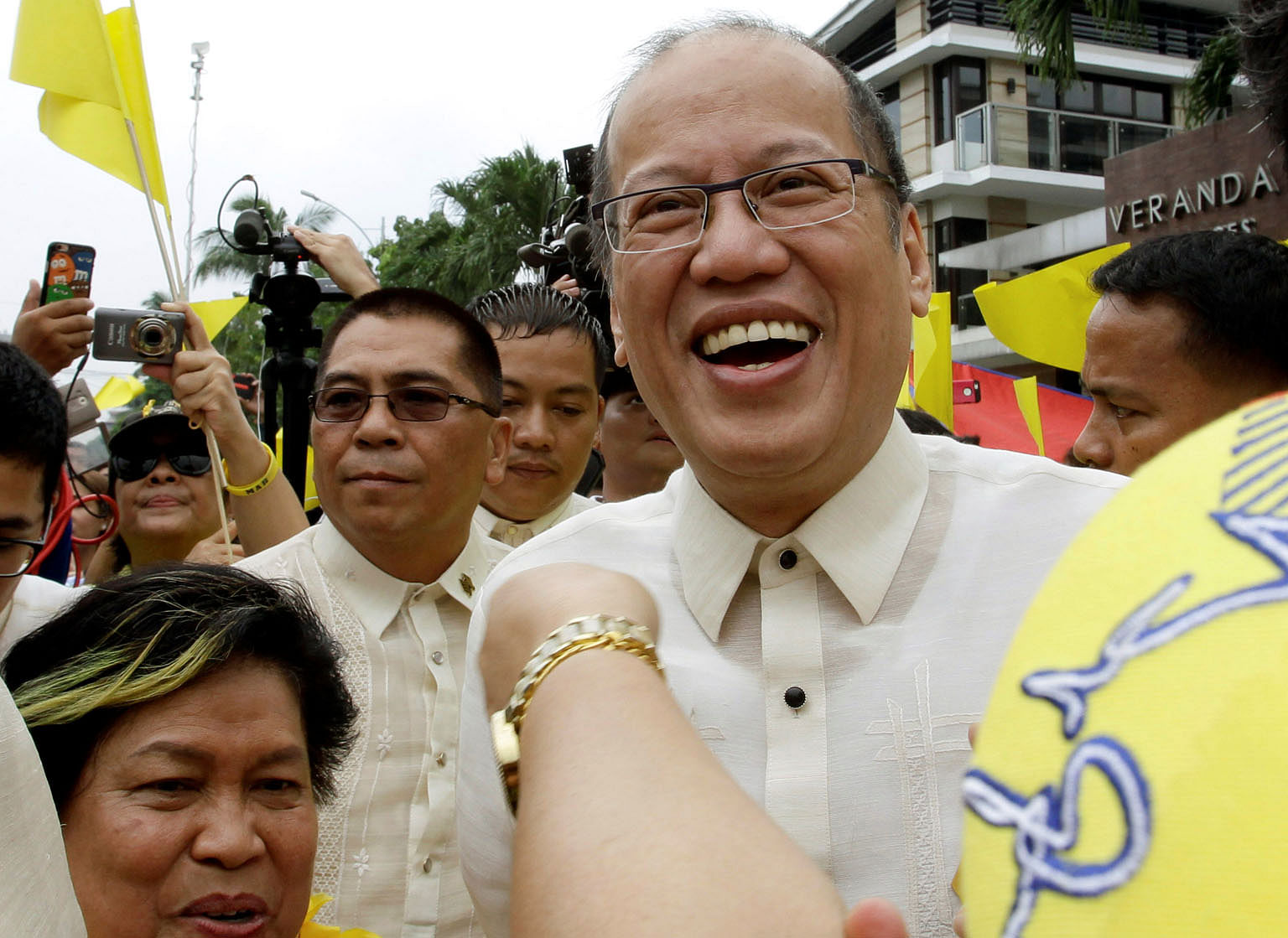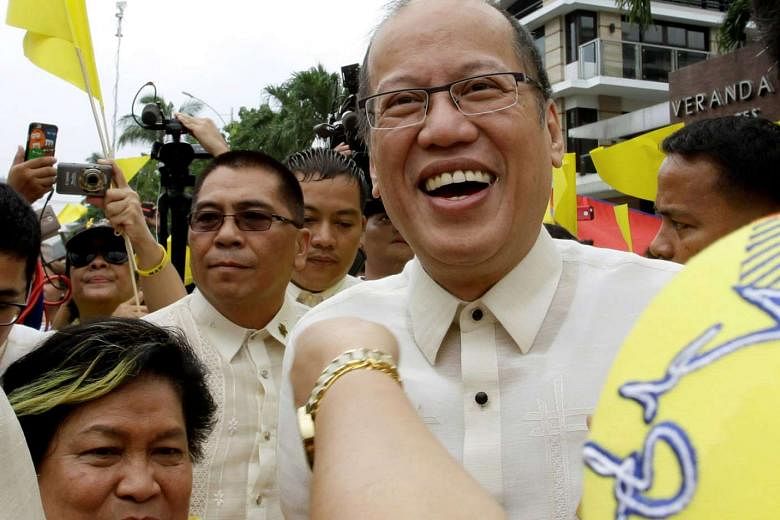Mr Benigno Aquino was the big-picture president. He saw the numbers, knew what had to be done and did it.
In six years from when he was elected president in 2010, Mr Aquino steered the Philippines to a period of prosperity it had not seen since the 1970s. The economy grew an average 6.2 per cent from 2010 to 2015, second only to China's. Ratings firms upgraded the nation's debt papers from junk to investment grade in 2013, a first in history.
With that, money began pouring in. The Philippines pulled in US$6 billion (S$8 billion) last year, a near-fivefold increase from the meagre US$1.3 billion it attracted in 2010. Outsourcing became a booming business, drawing in greenbacks and augmenting the over US$20 billion remitted each year by an army of Filipino migrant workers.
Spending grew. Property developers went on a building spree. Shopping malls packed in crowds eager to splurge on the latest smartphones, TV sets and clothing brands.
The big picture looked great and Mr Aquino was satisfied. Often, he would boast that under his watch the Philippines had, from being the "sick man of Asia", become a "darling" among world investors.
That was his mistake. Hubris.

He did not hear the growing grumblings on the ground or know that growth was not reaching, in ways that mattered to their lives, the bigger part of the population that had always felt left behind.
"The main problem with his economic policy was one of omission rather than commission. The government fell short of ensuring that the growing economic pie will become inclusive," political analyst Richard Javad Heydarian, at De La Salle University, said in a commentary picked up by The Huffington Post.
By 2014, the collective wealth of the 50 richest Filipino families had grown from US$34.4 billion in 2010 to US$74 billion. Economists calculated that the increased wealth of those families was equivalent in value to 51 per cent of the country's overall increase in gross domestic product (GDP). Together, the wealthiest earned about US$8.4 billion in 2014 alone.
In contrast, the minimum wage had grown by just 10 pesos (30 Singapore cents) per year, while the average Filipino household was earning a meagre 72,000 pesos to 235,000 pesos annually. Half of 100 million Filipinos rated themselves in a survey early this year as "poor".
The more Mr Aquino trumpeted his numbers, the more it stirred resentment among those whose lives were worse off under his rule, who felt cheated and let down.
A "Baa2 Stable" credit rating meant nothing to a store clerk who had to queue for over an hour just to get on a train that will take him to work 16km away. For a secretary who had to spend nearly four hours each day stuck in traffic, a 6.5 per cent bump in GDP did not really offer any relief. For a bus driver, the only numbers that mattered were fuel prices, and he saw them inching upwards as his income crept south.
It was the sight of a sea of cars stuck in traffic along metropolitan Manila's main highway, queues at train stations that stretched for 3km and commuters walking on railways because their train stalled mid-journey that came to represent everything that Mr Aquino was doing wrong.
His government - trying to avoid being seen as profligate or corrupt - did not spend enough on projects that would have had a more palpable impact on the majority of the population. In 2014, Congress gave Mr Aquino a 2.28-trillion-peso budget, but his government spent just 1.98 trillion pesos.
For the new budget minister, Mr Benjamin Diokno, "this is a sign of failure… Imagine what the unspent 302 billion pesos can buy for the government in terms of new roads, bridges, airports, seaports, irrigation facilities, urban transport systems and others".
"For the Aquino administration, underspending has been the norm. It should be spending more for public infrastructure to make up for past neglect and to bridge the Philippines' huge infrastructure gap. Yet, it has notoriously underspent, resulting in further worsening of the existing decrepit public infrastructure," he said.
FAILURE ON TV
It did not help that some of Mr Aquino's missteps unfolded in all their gut-wrenching drama on live TV.
In 2013, history's most powerful typhoon barrelled across central Philippines.
There were the haunting images.
An entire city levelled to the ground. Thousands - men, women, children, the old, the infirm - marching zombie-like with nothing but the clothes on their backs through a forest of tangled steel, wood, concrete, earth, vegetation. A man carrying the lifeless body of his six-year-old daughter to the morgue. Hundreds of corpses piled on the side of a road that led away from the airport.
Then the awful statistics: 6,300 dead, 29,000 injured, 200,000 evacuated, over four million displaced.
As the world watched, Mr Aquino's government reacted like a worn-out tractor's diesel engine: slow to react, and sputtering when it actually began moving.
There was the sight of warehouses stacked to the brim with rice and bottled water, yet undelivered, as millions huddled in damp, depressing evacuation centres.
There was Mr Aquino's point man pointedly telling a mayor from another political party to wait his turn for government assistance further down the line, even though his city had suffered the most.
This was not Mr Aquino's first test as a leader. In 2010, a distraught former policeman lugging an assault rifle boarded a bus and held 25 people - 22 tourists from Hong Kong, a tour guide and two Filipinos - as hostages.
What followed was a hostage drama that unfolded right at the heart of the capital Manila.
After half a day of fruitless negotiation, and with TV and radio networks broadcasting live, policemen stormed the bus in an almost comic rescue attempt: uncalled-for sniper fire; a sledgehammer that was used to try to break the bus' Plexiglas windows nearly falling on a Swat operative's head; the bus door refusing to budge as rescuers tried to prise it out with a rope.
When the dust settled, nine - eight from Hong Kong and the hostage-taker - lay dead on the bus floor, most of the hostages shot in the head by their captor.
Hong Kong was incensed. It demanded restitution and an apology from Mr Aquino himself. It would take three years to appease Hong Kong, mainly through the effort of former president Joseph Estrada, by then Manila's mayor, who flew to Hong Kong to deliver an official apology.
Mr Aquino said he regretted the incident, but never apologised for it. The rescue attempt was not his call, he insisted.
That Mr Aquino rarely apologises for anything has been his biggest character flaw, his critics insist.
They say he lacks empathy, that he is insensitive. I once asked Mr Aquino at a forum if he would attend the wake of a transgendered person murdered inside a motel in Subic town, near a former American military base. The suspect was an off-duty United States Marine, and the case had cast fresh scrutiny on Philippine-US relations.
His reply, widely reported, was: "In general, I don't attend wakes of people I don't know."
It was, for Mr Aquino, a natural reaction. But his political adversaries would later use those words to portray him as a leader who could not be bothered with the mundane affairs of the ordinary Filipino.
That, his critics say, is the reason why, in the end, voters rejected all that Mr Aquino stood for in the May 9 elections, and opted for a populist, anti-establishment, man-of-the-masses firebrand.
But it may be too early to judge Mr Aquino's place in history.
The numbers he brought to the table did not come out of thin air. He did bring prosperity. He did keep a nation of over 100 million on an even keel, even as financial upheavals battered other parts of the world.
It is, in fact, a testament to Mr Aquino's accomplishment that his successor, Mr Rodrigo Duterte, has opted for continuity in terms of running the economy.
Mr Aquino may be right about one thing. He never did have enough time to fix everything that was wrong with the Philippines. He had only six years, and that may not have been enough.


